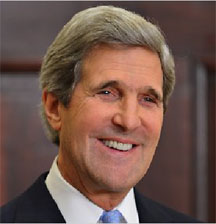ANTIGUA, Guatemala, (Reuters) – U.S. Secretary of State John Kerry will press for reform of the 35-nation Organization of American States and back a broad approach to tackling drug-related violence at OAS meetings this week, a senior U.S official said yesterday.
Kerry, who arrived in Guatemala yesterday, will also meet with Venezuelan Foreign Minister Elias Jaua on the sidelines of the OAS meetings today, the official said.

Venezuela has been a vocal critic of the United States in Latin America, and today’s encounter would be the first high-level meeting between the two countries in several years. Kerry is on his first official visit to Central America as President Barack Obama’s top diplomat.
The U.S. official said Kerry would push for an overhaul of the OAS to improve its effectiveness by refocusing its mission on the defense of democracy and human rights, while promoting security and development throughout the region.
In a belt-tightening environment, the United States, the OAS’s chief paymaster, is reluctant to see its contribution to the body increase and is pushing for the organization to put its finances on sounder footing, the official added.
“It is particularly important to us at this time of budget constraints that the OAS be using those funds responsibly,” the U.S. official said, speaking on condition of anonymity.
The meetings are set to debate new strategies in the region’s crackdown on drug gangs and discuss a recent OAS report on drug policy in the Americas, which called for a “flexible approach” and suggested that legalization of marijuana be considered.
The OAS urged a reconsideration of global drug policy at a general assembly in Guatemala this week, saying that efforts must focus on treatment of users and education rather than incarceration.
Central America has been ravaged by criminal violence as Mexican drug cartels, squeezed by attempts to root them out at home, have sought to diversify their operations southward.
The OAS, which issued a report in May calling for a softer approach toward drug users, said that harsh law enforcement policies face complex challenges and that member states should reach an agreement to improve prevention and reduce the demand for illegal substances.
Without issuing any concrete recommendations for new policies, OAS General Secretary Jose Miguel Insulza said that the meetings will encourage greater debate for reform.
“This won’t be the closing chapter, rather the opening chapter,” Insulza told reporters this week. “We are knocking on sensitive doors, but we need to examine drug policy.”
Guatemalan president Otto Perez, who met Kerry yesterday, has said the war on drugs in Latin America has failed and has called for decriminalization of narcotics.
After the meeting, Perez, a retired general, said the United States had shown it was ready to support “dialogue” on the issue.
CONCERN OVER VENEZUELA
The U.S. official said Venezuela had requested that Kerry meet with Jaua.
Washington has held back recognition of leftist President Nicolas Maduro, chosen successor of the late Hugo Chavez. “We still have concerns about how the deep divisions in Venezuela after the last elections get resolved,” the official said.
Maduro said immediately after the April 14 election that he was open to a full audit of the results, but in the following days ruled that out. The electoral authority several days later agreed to an extended audit, but the opposition refused to participate on the grounds that it was not sufficiently thorough.
Capriles alleges hundreds of election day irregularities and is challenging the results in the country’s top court.
“We would like a positive relationship with them,” the U.S. official said, adding that the United States was seeking a “positive, functional relationship on issues that we’re both interested in talking about.”
Disputes between Caracas and Washington were common during Chavez’s 14-year socialist rule. Maduro has said he wants better ties with Washington as long as the relationship is respectful. But he has also accused the United States of seeking to destabilize the country.
Historically, Venezuela has been the United States’ fourth-largest supplier of imported crude oil and petroleum products.
Kerry will also lobby for a position for the United States on the OAS’s Inter-American Commission on Human Rights.
Stanford law professor James Cavallaro, founding director of the Stanford Law School’s International Human Rights and Conflict Resolution Clinic, is vying for one of the three positions open this year on the commission.




